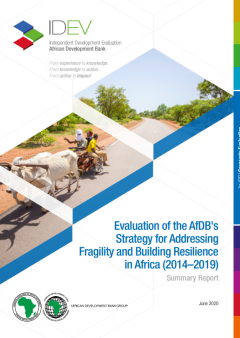
Evaluation of the African Development Bank Group’s strategy for addressing fragility and building resilience in Africa (2014–2019)
The Independent Development Evaluation (IDEV) has conducted an evaluation of the African Development Bank (AfDB or "the Bank")’s Strategy for Addressing Fragility and Building Resilience in Africa (“the Strategy”) for the period 2014 – 2019. The evaluation assessed the relevance of the Strategy and the Bank’s effectiveness in implementing it. The evaluation covered the Bank's assistance to Low-Income Countries eligible for the African Development Fund and featured permanently or temporarily on the Bank's lists of Transition States (countries where the main development challenge is fragility) during the 2014-2019 period. The aim of the evaluation is to inform the development of a new Bank Strategy addressing fragility.
During the evaluation period, the AfDB approved 354 operations, representing an overall amount of US 4.7 billion, for Transition States. In addition, 34 operations amounting to UA 322.1 million were approved for Transition States during the period under review. Investment projects represent 86% of the value of the Bank’s portfolio in Transition States over the period under review, the remainder being budget support programs.
The evaluation had two objectives. The first was an accountability objective, to report to stakeholders about the relevance and performance of the Bank’s assistance to Transition States under the Strategy. The second was learning, as the lessons learned from the evaluation will inform future strategies and operations of the Bank in Transition States.
The evaluation was designed to address the following four main questions: (i) To what extent has the Bank Group's assistance to Transition States been strategically relevant and adapted to the context of fragility? (ii) To what extent has the Bank's approach in Transition States evolved over time to allow it to operate differently in order to enhance its efficiency? (iii) To what extent has the Bank Group's assistance to Transition States produced the expected outcomes and contributed to reducing fragility while building resilience? and (iv) To what extent are the outcomes of the Bank’s assistance to Transition States sustainable to help create an enabling environment for the long-term objective of exiting fragility while building resilience?
Some of the key findings of the evaluation include:
- Overall, the Bank's Strategy was relevant to meet the specific needs of Transition States, although it was more focused on responsiveness than prevention.
- The evaluation found progress in the Bank adapting its procurement, gender and youth employment policies, its strategy papers and its system of allication to beneficiaries. However, more progress could be made with greater Bank-wide ownership of the Strategy.
- Overall, the Bank was able to adapt to the changing context and was able to react quickly in certain situations. It showed flexibility and responsiveness, but no selectivity. Also, despite Bank efforts, the positive results achieved are too modest to positively change the situation of Transition States.
- The Bank was able to mobilise various financing instruments, including for non-sovereign operations, to support Transition States in a context of continued decline in African Development Fund resources.
- The Bank increased its presence in Transition States through its Development and Business Delivery Model. However, its current field presence falls short of its objectives, and Bank staff believe that working in Transition States is not sufficiently recognised and valued by the institution. The evaluation also showed that the coordination momentum between partners varied, based on the economic and political context of the countries in relation to the partners’ interests.
- Overall, the timeliness of the Strategy’s implementation was found to be unsatisfactory. Only budget support operations were implemented in a highly satisfactory manner.
- The sustainability of the outcomes of projects was unsatisfactory mainly because of the fragility context.
The following recommendations were made to the Bank:
- Review the Strategy to make prevention one of its principles of engagement and strengthen its overall relevance by aligning its fragility dimensions with those of the Country Resilience and Fragility Assessment, while considering migration and forcefully displaced persons as potential fragility factors. Clear guidelines should be provided to improve selectivity in the context of fragility.
- Strengthen the Bank's presence in Transition States and the "One Bank" approach in the design and implementation of the future strategy while continuing to adapt policies, strategies, instruments, rules and procedures to fragility situations.
- Create conditions to better mainstream cross cutting issues such as gender, youth employment, dimensions of natural resources and climate change in the Regional Integration Strategy Papers, Country Strategy Papers and Bank operations in Transition States.
- Promote an integrated approach (strong synergy) in Transition States for investment projects and a structural approach to capacity building while adapting the instruments and financing arrangements of the private sector window to realities for Small and Medium-sized Enterprises in Transition States.
- Improve the motivation of staff working in Transition States by further improving living and working conditions while ensuring working in a Transition State is an advantage for their career development within the Bank
